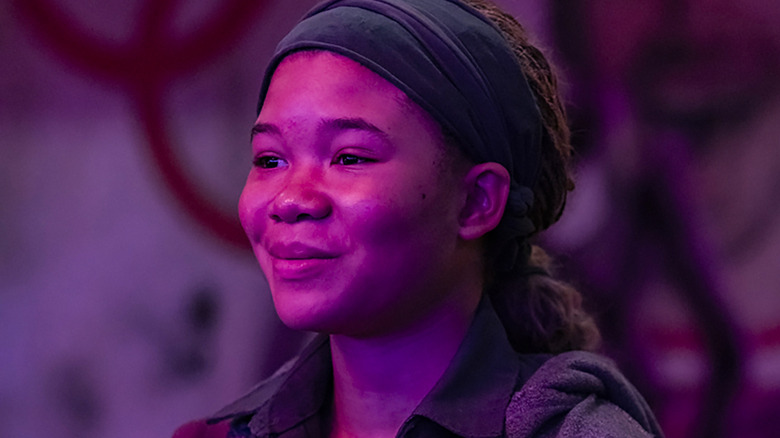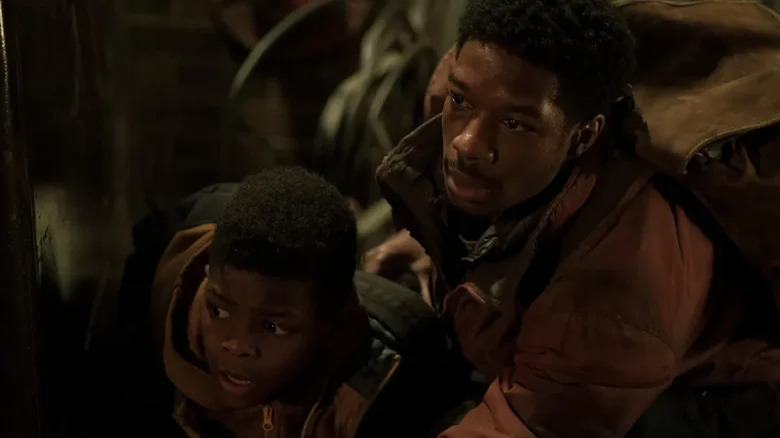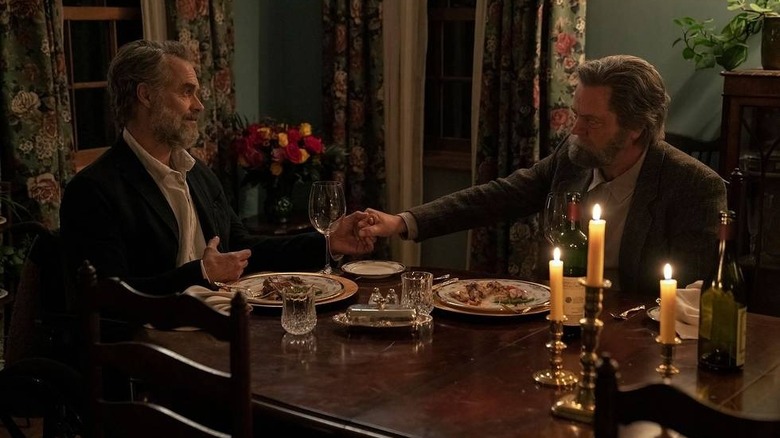HBO's The Last Of Us Is Continuing A Concerning Pattern From The Video Games
At first glance, there is little that separates "The Last of Us" from any other zombie show or film. There's the zombies (duh), lots of murderous raiders and hunters, surprise betrayals, and tragic deaths, with survivors finding that there is worse than just the undead out there.
And yet, the show (and the games it is based on) quickly makes a case for itself by introducing small yet significant additions to the zombie mythos that add up to a unique adaptation, one with fungal zombies — of different kinds! — that stand out from your standard ghouls.
Yes, this is still a story set in a bleak world desperate for some hope, a world where the mere mention of simple comforts like electricity and running water feel like a miracle. In the world of "The Last of Us," human connection is rare, so any meaningful connection is special because of how fleeting it is. In the show, and the games, no one is safe — especially if you're Black.
There's suffering, and then there's being Black in the zombie apocalypse
In the world of zombie apocalypses, we're used to seeing characters dying, to cruel things happening because, hey, it's the apocalypse. With civilization ended, betrayal and cruelty are the order of the day, and humanity as we know it is no more.
In the world of "The Last of Us," however, suffering is disproportionally assigned to Black characters, with the likes of Sam, Henry, Riley, and Sarah not just dying, but suffering horrible and pointless deaths. What's more, most of these characters are just kids. To see any kid die on a zombie show is bad enough already, but the games — and now the TV show — only seem to introduce Black characters to immediately kill them. All these characters have in common is that they are treated like emotional roadblocks for Joel and Ellie to confront, like lessons to be imparted to them.
When Sarah died in the first episode, it was the first big death on the show: the one that signaled the seriousness of the story, the one that sent Joel on a bleak path of nihilism and self-hatred. When Sam and Henry died tragically in a murder-suicide, it gave Joel panic attacks that made him reconsider his ability to keep Ellie safe. In episode 7, Riley's death happens at the same time that Ellie gets infected, leading to the discovery of her immunity and kickstarting the events of the show — while also teaching her about the cruelty of the world and motivating her character throughout the first season's story.
At every point, Joel and Ellie's story is written with Black bodies. What characterization they do have is in service of making their deaths mean something to Joel and Ellie's overall story, rather than to give them any real depth.
Not all deaths are made equal
This same thing happens in the games and only gets worse as the story progresses. "The Last of Us Part II" gives arguably the cruelest and most gruesome death in the franchise to a Black character.
On the other hand, there is Bill and Frank. In its third episode, "The Last of Us" takes a detour from Joel and Ellie's story to trace the life of a survivalist who falls in love and eventually builds a life together with Frank, a survivor who happens to stumble upon Bill's safeguarded neighborhood.
The episode was rightly praised by critics for its portrayal of Bill and Frank's relationship, and for making huge changes to the source material in order to deliver a rare heartfelt, nuanced gay relationship in the face of the apocalypse. Rather than a vague relationship that ends in tragedy, Bill and Frank die by ending things on their own terms, in love.
This makes the place this death has in Joel and Ellie's story much different, and kind of baffling. In the games, Bill and Frank are the first gay couple the player comes across, and the tragic and violent end of it heavily impacts Ellie going forward, with her seeing that happy relationships, especially queer ones, can't survive in the post-apocalypse.
But while Bill and Frank get a dignified death that serves their own story in the show, the same cannot be said of any of the Black characters. Henry and Sam did not get a proper end to their story, nor did Riley. We don't get to see the beginning or even the middle of their journeys, only the parts convenient to motivate Joel and Ellie before leaving them to die horrible deaths.


